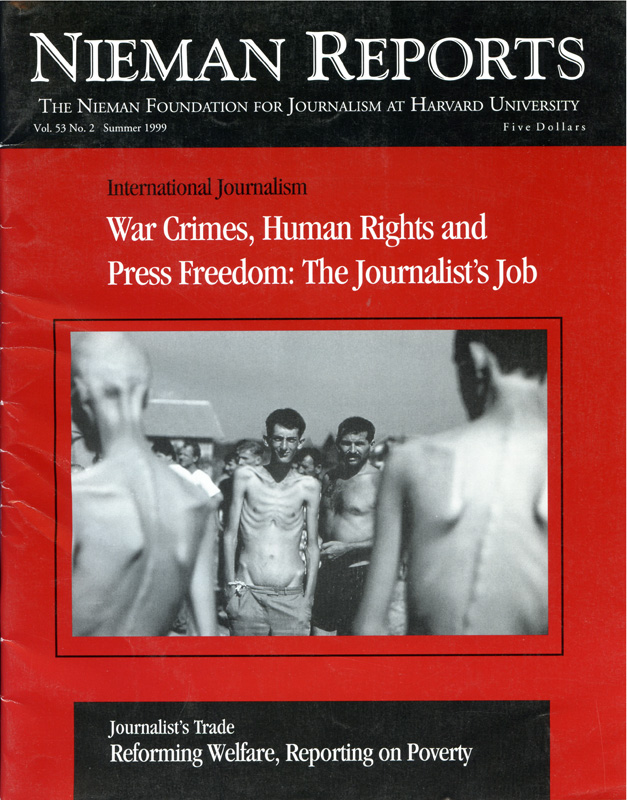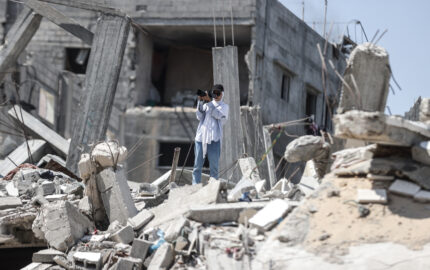First stumbled onto the Kosovo Liberation Army in the small village of Orlane about 30 miles from Pristina. It was February 1997, and a thin crust of snow blanketed the rolling hillsides. The crude wooden houses, all with teetering It is one of the hallmarks of our trade that stories we report can assist, in the short term, those we would least like to empower.outhouses, barren dirt yards and braided briar fences, were surrounded by mourners attending the wake for one of three armed militants killed in a gun battle with Serb police. Along the road grim men in nylon sweat suits stood every 20 or 30 feet providing a cordon of security.
The story I wrote for The New York Times from Orlane, and several that soon followed, angered the pacifist Kosovo Albanian leader Ibrahim Rugova and no small number of Western diplomats and reporters who insisted that the guerrilla group was a creation of the Serbian state security. It was over a year before the rebellion that gripped the province, and there was still a forlorn hope that a negotiated agreement with Belgrade could be worked out. Rugova, with backing from the U.S. Embassy, was trying to get Belgrade to reopen schools for Albanian elementary students. Such reporting, he told me, was not only inaccurate but unhelpful.
“The Serbs have created the Kosovo Liberation Army to give themselves an excuse to ethnically cleanse Kosovo,” he said, “just as they did in Bosnia. I know my people and they do not support the use of violence.” How does one cover such a story, one that because of its implications, both real and perceived, erodes the beleaguered forces struggling to prevent a slide to intolerance and war? What does one do when the stories one writes become grist for the Serb propaganda effort, or any effort, to foment conflict? What moral obligations do we, as journalists, have to those we are writing about? It is one of the hallmarks of our trade that stories we report can assist, in the short term, those we would least like to empower.
Belgrade was elated with the first reports about the small armed bands, citing them as evidence that there were “terrorists” in Kosovo that they had a right to root out by force. I saw the same reaction from Baghdad when I wrote about the splits between the two main Kurdish factions in northern Iraq that eventually led to street fighting. I sat on floor cushions in a room one night in northern Iraq, thick with the bluish haze of acrid cigarette smoke, as armed Peshmerga guerrillas listened to Baghdad’s Kurdish-language propaganda radio station read every word of stories I had done on the feuds and growing corruption in the Kurdish safe area set up by the allied coalition following the Gulf War. The bearded Kurdish fighters shifted uncomfortably and glowered at me in disapproval.
In the summer of 1998, during the early stages of the Kosovo conflict, before Slobodan Milosevic ordered his troops to raze villages and drive out tens of thousands of people, burly Serb policemen ushered us through checkpoints towards villages held by armed rebels with unusual courtesy. Clearly the idea was to allow Western reporters to send out stories and footage of the ragtag insurgents in the hopes that the Western alliance would excuse Belgrade when it began to depopulate and raze the rebel zones.
And it was axiomatic that, as in Bosnia, once Milosevic cranked up his machinery of death and mayhem we were expelled, left to lick around the edges of his killing fields, struggling to distinguish rumor from fact in interviews with disoriented refugees, but essentially cut off from firsthand accounting, just as we were during the Serb massacres in Srebrenica. Reporters in Belgrade now get bused around to see civilian casualties, just as they did in Iraq, but are kept far from the muddy fields where perhaps hundreds of Kosovar Albanian men lie in mass graves.
There were few stories out of Kosovo when I began reporting on the rebels, in part because the Bosnia story had cooled and there were few reporters around. It was widely believed that the Kosovar Albanians had no stomach for a fight and conventional wisdom took the place of investigation. It was hard to get anyone to pay attention. When I made the first trip by any reporter inside Kosovo in the spring of 1998 with an armed guerrilla band my paper held the piece for nearly three weeks, only running it after Milosevic launched the spring offensive that triggered the province-wide rebellion.
The lines blur between reporting and propaganda in such a controlled atmosphere. Yet the consequences of not having such information reported, in the long term, are devastating. It may have been disruptive to acknowledge the rise of an armed militant faction in Kosovo, but it also was true. And it was the last warning light given off before war, one that was sadly ignored by Rugova and his Western backers. Instead of acknowledging these reports as the rumblings of a coming catastrophe, they turned, as often happens, on the messengers.
When it came time to walk three or four miles into towns where the Serbs had butchered women and children in Kosovo our reporting stung, precisely because it had refused to serve any one particular cause. While many diplomats and Rugova supporters chastised us for our coverage, our refusal to consider the implications of our coverage gave us credibility when we wrote of killings by Serb forces. Credibility is a fragile and delicate commodity and once damaged is very hard to repair. Indeed, it is against the credibility of Western reporting that the Serbian regime, like most regimes, has waged war since the fighting began eight years ago. It behooves us not to assist them by bowing to what, in the short term, is politically expedient.
The temptation every reporter faces is to paint the world in his or her own image, or the image we would like it to assume. Thus rebels in Nicaragua, Muslims in Sarajevo or even Serbian opposition leaders in Belgrade have sometimes been portrayed more as we wish them to be, or they ought to be, rather than as they are. This is the disease of our profession, one exacerbated because such reporting allows us to be celebrated by people under siege, people whose adoration we find gratifying.
But by failing to turn with equal ferocity on all sides we distort these conflicts and discredit the values of tolerance and forbearance by ascribing them to people who do not, in fact, share them. Indeed, the failure by many reporters in Belgrade to recognize that the political opposition in Belgrade, who for three months in the winter of 1997 took over the streets of the capital, was at its core nationalist made it impossible to grasp a fundamental fact about the Serbs. Most Serbs, even those who detest Milosevic, willfully ignore the scope and extent of the atrocities carried out in their name in Bosnia, Croatia and Kosovo. In this sense they are like the Turks who cling to the Devastation of houses in the village of Kozarac, Bosnia, taken in March 1999. Photo by Radivoje Pavicic, courtesy of The Boston Globe. fiction that the Armenian genocide earlier in the century never took place. Most Serbs nurture the absurd belief that they are the real victims in the war.
The problem in Serbia is not only Milosevic, but the refusal to come to grips with how the enthusiastic embrace by the Serbs of ethnic triumphalism resulted in the destruction of Yugoslavia and mass murder. Until this is understood, with or without Milosevic, the Serbs are doomed to carry on a dialogue with outsiders that resembles that between Alice and the March Hare.
“Have some wine,” the March Hare said in an encouraging tone.
Alice looked all round the table, but there was nothing on it but tea. “I don’t see any wine,” she remarked.
“There isn’t any,” said the March Hare.
It is not for us to decide what people should or should not know. This kind of manipulation is the work of advertisers and propagandists. Lies, including the lie of omission, do work briefly, but once uncovered sully the values they may have been employed to protect. The failure to report honestly erodes the concept of dispassionate truth and ironically empowers tyrants like Milosevic, who seek to avoid its scrutiny by denying its existence.
Chris Hedges is a 1999 Nieman Fellow and was the Balkan Bureau Chief for The New York Times from 1995 to 1998. He won this year’s Hofstra University Francis Frost Wood Award for Courage in Journalism for his coverage of the war between the Kosovo Liberation Army and the Serbian military in 1997 and 1998.



